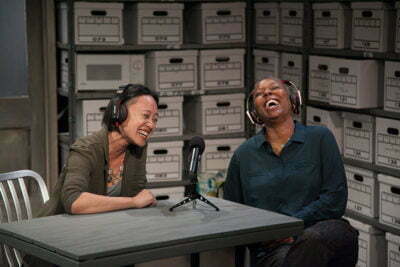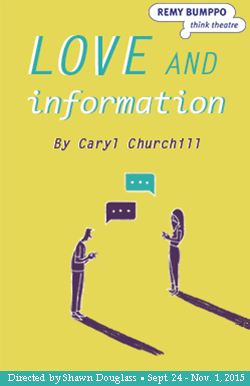Love and Information
Directed by Shawn Douglass
Produced by Remy Bumppo
Playing at the Greenhouse Theater, Chicago
Life is Full of Feelings and Stuff
If you have formal artistic training, at some point, you were probably in a class in which you were instructed to write a scene in a minute. Then, to make sure everybody did the assignment, the students all read their scenes out loud, and learning happened. With the help of professional production values from Remy Bumppo, that’s basically what Caryl Churchill’s 2012 play Love and Information is. The work consists of fifty-seven scenes, which are loosely themed around how the brain processes information, which is to say, the play is about literally everything. As is frequent with Churchill’s more recent plays, she provided only dialogue. Who is speaking and in what context are choices by director Shawn Douglass and his ten-actor ensemble, making their production distinct from any other.

In the first scene, we see a high school couple (Gregory Fener and Emjoy Gavino) who are arguing over a secret. He doesn’t want to tell her what it is, she wants to know, and he says if she did, she would wish she didn’t. Of course, we never learn the secret, and never see these people again or have any reason to care about them. That sets the standard for most of what is to come. The focus on cognitive processing is established by an early sequence in which a scientist describes an experiment which allows him to observe the physical formation of memories inside the dissected flesh of chicken brains. Though the scene has no emotional impact, it does provide something more interesting to think about: how all our emotions, memories, personality traits, and everything else that makes up our character, is a biological, chemical process. Churchill is a playwright, not a neuroscientist, so something you could glean from a single article in The Guardian is as close as close to an in-depth investigation into cognitive processing as we get in any scene, but at least, it becomes more apparent what Churchill is trying to do. She and Douglass’s creative team are interested in the messy consequences of our natural, rude, fallible meat-based computers on each other.

Despite some rocky starts, the production is effective at landing the emotional punch of that viewpoint some of the time. A few stand-outs are David Darlow as an elderly man driven to paranoia by dementia, who believes his wife (Mary Poole) is an imposter, and Raymond Fox and Penelope Walker debating the efficacy of prayer. Other scenes are light-hearted and funny, such as when a pair of One Direction fans panic when they realize even Google cannot tell them everything about their crushes. But the funniest scenes are the ones in which Churchill pokes fun at her past writing, such as when a pair of men wonder why they wanted for Saddam Hussein’s weapons of mass destruction to be a hoax and took such pleasure in their government discrediting itself, or when somebody gets cut off with a glare for raising the Israeli/Palestinian conflict.

However, most of the scenes are just cursory references to pop psychology. In one five-second-long incident we are reminded that PTSD exists, in another, that free will does not, and in a third, that stoners are funny. The actors always adapt well to their rapid shifts in character. A few movements and a vocal inflection go almost the whole way to establishing what kind of person they are playing in the current scene, and they have over a hundred people to embody in just a few minutes. A plethora of costumes by Emily Waecker and props by Linda Sherfick get them the rest of the way to verisimilitude, and Jacqueline and Richard Penrod’s set of boxes in storage make the playing space flexible enough to encompass anything that can happen inside the mind. There is nothing wrong with Douglass’s production. Most of the contexts the creative team invented for the dialogue fit well. It may be that I am jaded from seeing this style done badly too often among amateur theatre practitioners, and so I anticipate all its tricks and quips, or that Churchill’s musings on the mind-body link are fresher to most people than I give credit for. But I question whether this whirlwind of snippets from random people’s lives ever coalesces into something significant.
Somewhat Recommended
Jacob Davis
Playing at the Greenhouse Theater Center, 2257 N Lincoln Ave, Chicago. Tickets are $42.50-52.50 with discounts for students and groups; to order, call 773-404-7336 or visit RemyBumppo.org. Performances are Thursdays through Saturdays at 7:30 pm and Sundays at 2:30 pm with select Wednesday and matinee performances through November 1. Running time is eighty minutes with no intermission.

